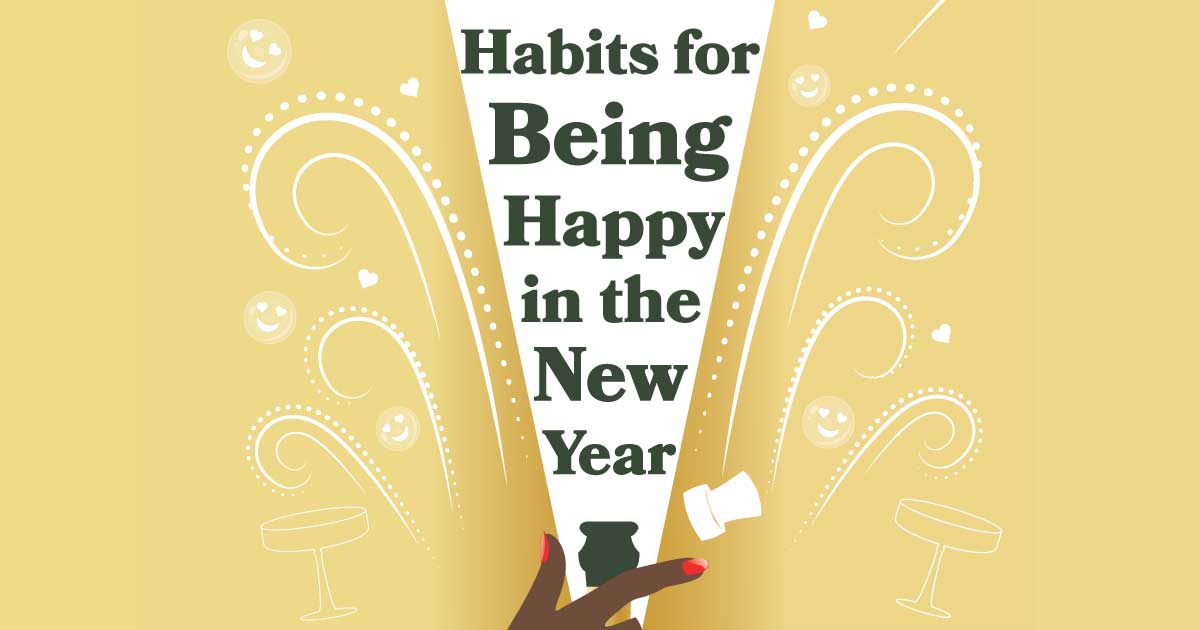
Incorporate these nine tips into your life for a more positive 2023
This year, instead of making a sweeping resolution, why not try some small new behaviors that are proven by research to increase happiness?
I have spent the past two years studying the Science of Happiness (also known as positive psychology). Research findings show that making small changes in your daily life can have a big impact on your overall happiness. Not only do happier people generally feel better, but they also have more energy, better relationships, improved mental and physical health, higher income, better performance at school and work, more creativity and better productivity— among other things.
The research-based strategies for increasing happiness are quite varied. Here are some ideas to try for yourself:
1. Cultivate Optimism:
The Science of Happiness does not suggest that we must be positive and happy all the time to have a great life. In fact, research suggests that it’s important to feel all of our emotions fully. However, we can make a big difference in our lives by cultivating an optimistic outlook.
Are you usually focused on the “worst case scenario,” all the things that could go wrong or how horrendous your to-do list is? These thoughts are powerful and they create your attitudes, your words and your actions.
Try these strategies for cultivating optimistic thoughts:
- Work to notice pessimistic thoughts and try replacing them with more optimistic ones.
- Notice what’s right in the situation, rather than just what’s wrong.
- Ask yourself, “What good could come from this situation?”
- Remember times things have worked out in the past and know that they can/will again.
- Visualize (or journal about) what is possible for yourself.
- Give yourself and others the benefit of the doubt.
2. Do Something Purposeful
Pursuing goals and projects that align with our strengths and values makes us happier. Think about your strengths and how you could put them to use on something that sounds fulfilling to you.
Are you a good team builder? A creative person? A problem solver? Find something that uses those strengths! Also, when setting a goal, make sure it’s something that aligns with who you are and feels personally significant to you as opposed to something you think you should do.
3. Practice Gratitude
Most of the time, we fail to appreciate the good in our lives. Research shows that humans have a “negativity bias,” which causes us to focus mostly on mistakes we made, work that didn’t get done, bad news, complaints we hear from family and friends, etc. That definitely makes us less happy! Simply noticing and feeling gratitude for what is going well makes a BIG difference and creates an “upward spiral of growth and wellbeing.”
Here are some ways to feel gratitude:
- Try a gratitude journal. Write down five things that you are grateful for every day. These can be big things (my health, living in a beautiful city) or small things (my comfy bed on this stormy day, a big hug from my daughter this morning, beautiful orange leaves on my walk).
- Think toward the future. Once per day, write down three things you’re looking forward to today or tomorrow.
These simple exercises (done daily or even once a week) can shift you toward more hopeful, positive and joyful emotions, allowing you to reach goals more easily and even improve your health. Good and bad things happen to everyone – it’s fundamentally what we choose to focus on that determines our happiness!
4. Spread Kindness
Believe the research – extending kindness to others absolutely makes you happier! Being generous and considerate raises our positive emotions, making us feel more confident and useful as we use our personal strengths. Kindness often includes genuine social connection with others, and it distracts you from your own troubles and ruminations.
Kind acts can be small and brief. Here are some ideas:
- Return someone’s grocery cart
- Donate blood
- Do someone else’s dishes
- Cook a meal for a friend
- Offer a sincere smile and kind words to a cashier
- Visit a nursing home
- Really listen (with eye contact) to someone
- Volunteer your time
- Thank someone for their hard work
Research shows that doing something “new and special” and doing several kind acts per day will give you a big happiness boost.
5. Increase Social Connections
Relationships are the number one predictor of happiness. Add more happiness in this area by making time for the people in your life who are important to you. We aren’t fully present with our loved ones when distracted by technology and to-do lists. Our fun, communication and connection suffer as a result.
Make time to be fully present (phones away), even for a few minutes, with someone important to you every day! Your happiness (and
theirs) will go up!
6. Add More Movement
Just adding movement to your day can bring big improvements to your psychological and physical health! The Journal of the American Heart Association has published multiple studies that show a great improvement in overall health from short spurts of activity – even under 10 minutes!
Movement and exercise help with anxiety and ADHD/ADD, and also improve mood, memory, creativity and ability to focus. It increases self-esteem, decreases likelihood of dementia by 52%, reduces chronic diseases, and helps you live longer!
Try incorporating micro-movements every two hours:
- Walk up and down the stairs a few times instead of scrolling on your phone
- Go for a walk to catch up with a friend
- Have a dance break
- Stretch while you watch TV
- Fit in a mini yoga session
7. Make Time for Recovery & Rest
Our lives are generally go, go, go! It has been proven that we need time to rest and recover. Our bodies and minds do not perform at their best when we don’t have downtime. We end up feeling grumpy, short-tempered, less creative and more.
It’s counterintuitive, but you will be more ready to tackle your to-do list if you take a break every day! What works for you – a quiet walk, reading a book, a few minutes enjoying a cup of tea, a dance break, a bath or a nap?
8. Celebrate Your Successes
Every time you do something good (from drinking your water to completing a work project), celebrate it and be your own cheerleader! Write it in your journal, share it on social media or tell a friend! It might sound silly but celebrating even our small “wins” has a big impact on our happiness. It increases our mood, self-confidence and the likelihood that we’ll take more positive action.
9. Meditate
In our fast paced, hectic world we have many inputs in our lives (phones, emails, people, long to-do lists), which make us anxious, depressed, scattered and unhappy. We’re often worrying about the past and the future and have a monkey mind full of thoughts that jump around and don’t stop for a split second!
The goal of meditation is to allow your mind to rest and get present. When we rest it, we feel better and research shows amazing results: reduced anxiety and stronger immune responses as well as improved mood, memory, creativity, focus – and more. We also feel calmer and more present in our everyday lives, which allows us to notice all the awesomeness around us (from the chirping birds to the smell of the cookies baking).
Try this:
- Meditate 2-3 minutes per day. It has shown amazing results.
- Try a free meditation app.
- Try “square breathing,” something you can do anytime. Breathe in for a count of 4, hold breath for 4. Repeat a few times and feel the relaxation wash over you.
Increasing your happiness is absolutely doable and within your control, but you do have to take action to make it happen! Why not try all of these things and see how each of them help you?
Another big benefit of improving our happiness is the ripple effect, which is known in positive psychology as the “virtuous upward spiral.” The happier we feel, the more likely we are to help others. So, work on your own happiness, and you’ll spread it through ripples into your family, your friends, your local barista, etc.
Kim Foster is a Grand Ridge Drive resident. Join her new workshop “The Science of Happiness, Tools to Help You Thrive” in March 2023.





